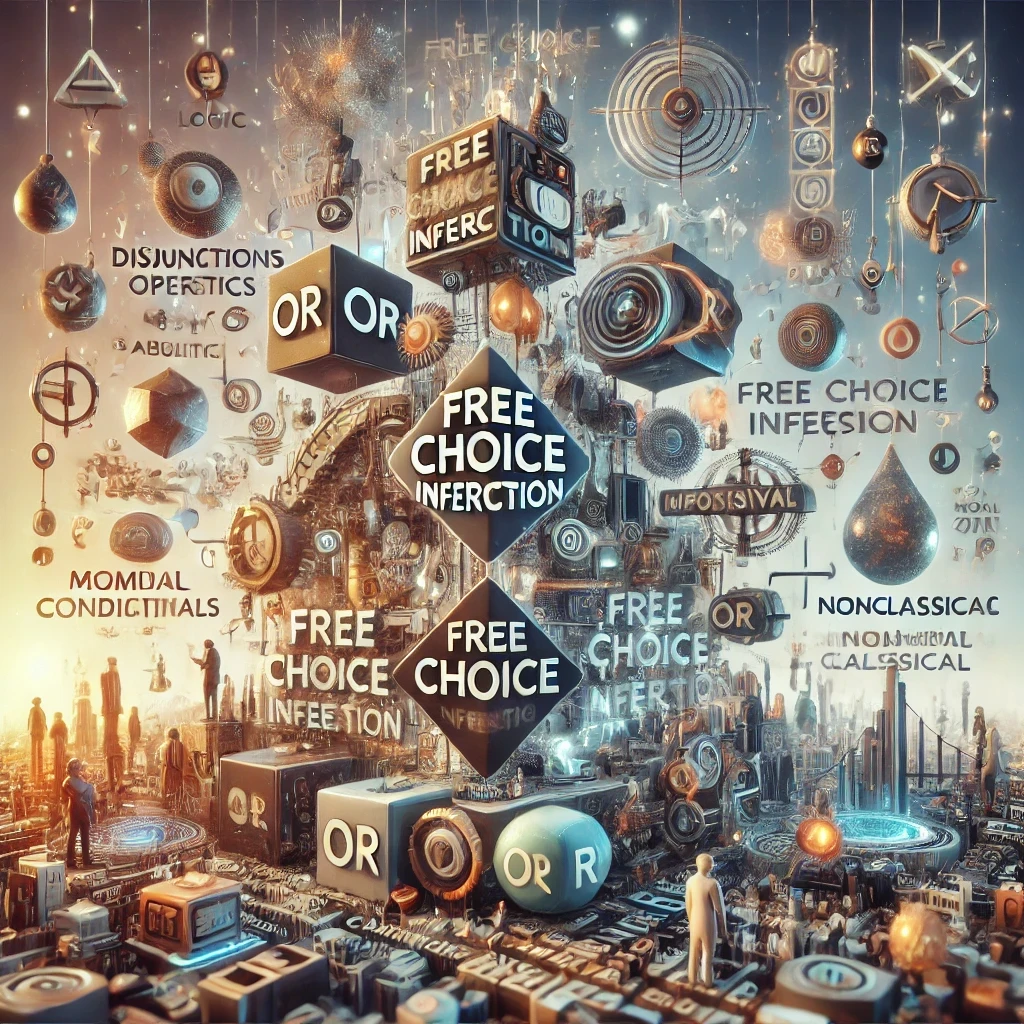
How Free Choice Inference Changes What You Know About Language
By:
Federico Ramallo
May 2, 2024

How Free Choice Inference Changes What You Know About Language
By:
Federico Ramallo
May 2, 2024

How Free Choice Inference Changes What You Know About Language
By:
Federico Ramallo
May 2, 2024

How Free Choice Inference Changes What You Know About Language
By:
Federico Ramallo
May 2, 2024

How Free Choice Inference Changes What You Know About Language
By:
Federico Ramallo
May 2, 2024
How Free Choice Inference Changes What You Know About Language
Free choice is a phenomenon in natural language where a linguistic disjunction appears to receive a logical conjunctive interpretation when it interacts with a modal operator.
Free choice inference is a linguistic phenomenon where expressions of choice, typically involving the word "or," imply multiple possibilities can be pursued independently in the context of permissions or abilities.
This intriguing concept challenges classical modal logic, prompting research across formal semantics, philosophical logic, and various nonclassical frameworks.
The exploration of free choice inferences extends to various modalities and linguistic structures, including imperatives and conditionals, illustrating the complexity of natural language interpretation and the intricacies of human cognition.
How do you perceive the balance between linguistic expression and logical interpretation in your daily communication?
How Free Choice Inference Changes What You Know About Language
Free choice is a phenomenon in natural language where a linguistic disjunction appears to receive a logical conjunctive interpretation when it interacts with a modal operator.
Free choice inference is a linguistic phenomenon where expressions of choice, typically involving the word "or," imply multiple possibilities can be pursued independently in the context of permissions or abilities.
This intriguing concept challenges classical modal logic, prompting research across formal semantics, philosophical logic, and various nonclassical frameworks.
The exploration of free choice inferences extends to various modalities and linguistic structures, including imperatives and conditionals, illustrating the complexity of natural language interpretation and the intricacies of human cognition.
How do you perceive the balance between linguistic expression and logical interpretation in your daily communication?
How Free Choice Inference Changes What You Know About Language
Free choice is a phenomenon in natural language where a linguistic disjunction appears to receive a logical conjunctive interpretation when it interacts with a modal operator.
Free choice inference is a linguistic phenomenon where expressions of choice, typically involving the word "or," imply multiple possibilities can be pursued independently in the context of permissions or abilities.
This intriguing concept challenges classical modal logic, prompting research across formal semantics, philosophical logic, and various nonclassical frameworks.
The exploration of free choice inferences extends to various modalities and linguistic structures, including imperatives and conditionals, illustrating the complexity of natural language interpretation and the intricacies of human cognition.
How do you perceive the balance between linguistic expression and logical interpretation in your daily communication?
How Free Choice Inference Changes What You Know About Language
Free choice is a phenomenon in natural language where a linguistic disjunction appears to receive a logical conjunctive interpretation when it interacts with a modal operator.
Free choice inference is a linguistic phenomenon where expressions of choice, typically involving the word "or," imply multiple possibilities can be pursued independently in the context of permissions or abilities.
This intriguing concept challenges classical modal logic, prompting research across formal semantics, philosophical logic, and various nonclassical frameworks.
The exploration of free choice inferences extends to various modalities and linguistic structures, including imperatives and conditionals, illustrating the complexity of natural language interpretation and the intricacies of human cognition.
How do you perceive the balance between linguistic expression and logical interpretation in your daily communication?
How Free Choice Inference Changes What You Know About Language
Free choice is a phenomenon in natural language where a linguistic disjunction appears to receive a logical conjunctive interpretation when it interacts with a modal operator.
Free choice inference is a linguistic phenomenon where expressions of choice, typically involving the word "or," imply multiple possibilities can be pursued independently in the context of permissions or abilities.
This intriguing concept challenges classical modal logic, prompting research across formal semantics, philosophical logic, and various nonclassical frameworks.
The exploration of free choice inferences extends to various modalities and linguistic structures, including imperatives and conditionals, illustrating the complexity of natural language interpretation and the intricacies of human cognition.
How do you perceive the balance between linguistic expression and logical interpretation in your daily communication?
Explore other blog posts
Explore other blog posts